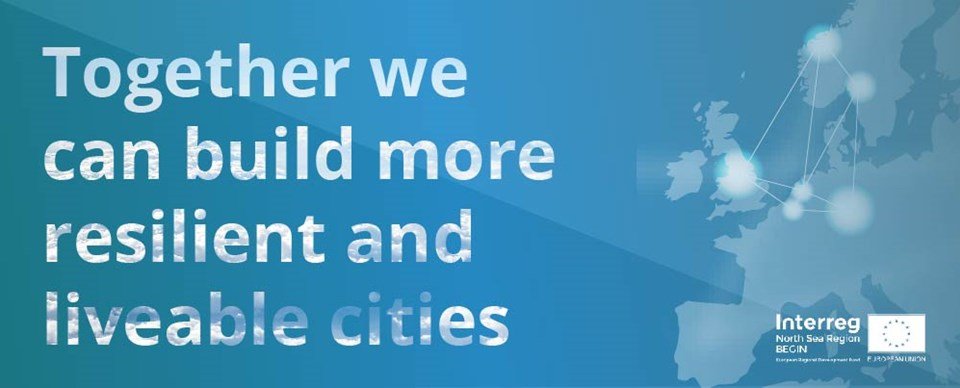
The overall objective of BEGIN is to demonstrate at target sites how cities can improve climate resilience with Blue-Green Infrastructure involving stakeholders in a value-based decision- making process to overcome its current implementation barriers.
BEGIN’s driving ambition is to substitute traditional ‘grey infrastructure’ such as concrete for ‘blue-green infrastructure’ (BGI) such as parks, rivers, and lakes.
Preliminary results indicate that financial impact from extreme flood events might be reduced by over €9 million/year.
BEGIN has been granted a one-year extension (to July 2021) which now enables the project to build further on its results to create additional social benefits including enhanced public health. With the extension, BEGIN’s partner cities expect the project to generate long-term social, environmental and financial benefits worth over €430 million – more than 90 times the EU funding.
- Developing climate change adaptation; improving risk management and resilience
- Flood peak reduction
- Reduce flood risk
- Developing climate change mitigation
- Improve connectivity and functionality of green and blue infrastructures
- Increase Biodiversity
- Increase quality and quantity of green and blue infrastructures
- Improve air quality
- Increase accessibility to green open spaces
- Increase amount of green open spaces for residents
- Increase awareness of NBS solution & their effectiveness and co benefits
- Increase communities’ sense of ownership
- Increase social interaction
- Increase stakeholder awareness & knowledge about NBS
- Increase well-being
- Increase willingness to invest in NBS
- Provision of health benefits
- Social inclusion
- Social learning about location & importance of NBS
The BEGIN policy brief including recommendations for optimal BGI implementation will be published in Spring 2020.
The Interreg North-Sea Region project BEGIN accelerates climate adaptation by reducing urban flood risk in the North-Sea Region while promoting social innovation. BEGIN is substituting traditional ‘grey infrastructure’ such as concrete for ‘blue-green infrastructure’ (BGI) such as parks, rivers, and lakes. Preliminary results from BEGIN’s pilot sites indicate a flood risk prevention of over 30%.
About BEGIN
Since 2016, the project has been implementing BGI pilots in 10 cities in Germany, the UK, Belgium, the Netherlands, Sweden and Norway. To enhance the social benefits of blue-green climate adaptation measures, BEGIN applies a social innovation approach, involving hundreds of citizens in generating ideas for the shaping of new parks, wet areas or water bodies in their local area.
Blue Green Infrastructure
Cities are not sufficiently prepared for ever more frequent and heavier rainfall due to climate change. The conventional grey infrastructure (e.g. sewer system and the like) needs additional so-called 'blue green' solutions. 'Blue' means: for instance more capacity for water storage and drainage. 'Green' means: less pavement for example. These blue green measures do not only help to cope with the extreme weather conditions, they also contribute to a more attractive and enjoyable living environment. It is BEGIN's aim to find and show improved climate adaptation solutions in urban areas, to identify the benefits, and to have measures installed and maintained by social initiatives, and finally, to have blue green infrastructure perceived as an obvious and integral part of urban development, by developing projects and lowering thresholds.
One-year extension to generate benefits worth over €430 million
BEGIN has been granted a one-year extension which now enables the project to further build upon its results to create additional social benefits, including enhanced public health. With the extension, BEGIN’s partner cities expect the project to generate long-term benefits worth over €430 million – more than 90 times the EU funding. Partners now have until July 2021 to develop and apply a new liveability approach which will lead to more blue-green urban spaces and less flood risk as well as increased social involvement and public use of pilot parks, ultimately leading to better urban health.
For detailed information on the pilot sites and latest developments, visit https://northsearegion.eu/begin/approach/
| Lead beneficiary | City of Dordrecht |
| ETG.Kelder@dordrecht.nl |
Further information
- 3. Good Health and Well-being
- 11. Sustainable Cities and Communities
- 13. Climate Action
